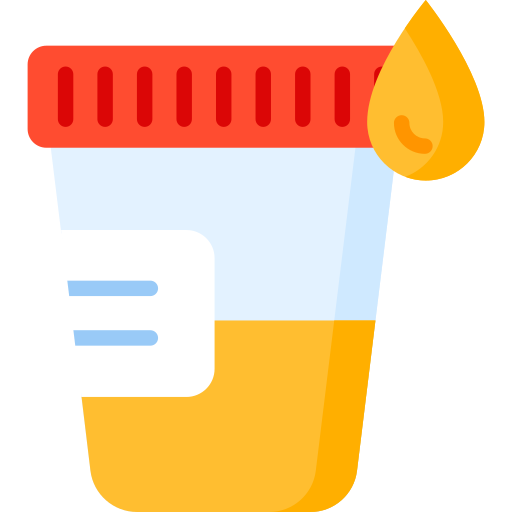Urine Test
General examination, Urine culture.

Description and Necessity
A general urine test is considered to be a very simple laboratory examination. At the same time though, it is one of the most basic diagnostic tools, suitable for the detection of a huge variety of illnesses and symptoms such as infections of the urinary system, the liver, the reproductive system, the sudden appearance of diabetes etc.
The color, the transparency and other natural characteristics of our urine, as well as the different substances that can be found in its composition, provide indications for a variety of different conditions such as hereditary or non-metabolic diseases, kidney disorders, tumor malignancies, substance abuse, toxin exposure and high or insufficient liquid intake.
The medical significance of urine examinations can be demonstrated by how much information they reveal about the general health of the patient. That is why they are a necessary part of every preventive check-up.
The color, the transparency and other natural characteristics of our urine, as well as the different substances that can be found in its composition, provide indications for a variety of different conditions such as hereditary or non-metabolic diseases, kidney disorders, tumor malignancies, substance abuse, toxin exposure and high or insufficient liquid intake.
The medical significance of urine examinations can be demonstrated by how much information they reveal about the general health of the patient. That is why they are a necessary part of every preventive check-up.
URINE CULTURE
Urine cultures are necessary:
– when there are symptoms of infection in the urinary system, such as pain when urinating (dysuria), frequent urinations, high fever and kidney irritation.
– when there is no improvement in the patient’s condition after receiving antibiotics for the treatment of urinary tract infection.
– as a preventive measure in pregnant women.
– when there are odd symptoms in young and newborn children, such as the inability to gain weight.
– in pre-surgical checks prior to urological or kidney operations.

What they include
Some of the most common examinations conducted on urine samples are the following:

General urine test

Urine culture

24hour urine test (detects the presence of leucoma, Hydroxyprolin, etc.)
The 3 parts of a Urine Test.
The urine analysis is carried out by visual inspection (natural characteristics), with the use of a urine test strip (chemical characteristics) and with the use of a microscope (biological characteristics).

Natural Characteristics
- Hue
- Physical Appearance
- Odor
- Precipitate
- Specific weight
- Reaction

Chemical Characteristics
- Bilirubin
- Leukocyte esterase
- Blood (red blood cells, hemoglobin, myoglobin)
- Protein
- Glucose
- Ketones

Biological Characteristics
- Epithelial cells
- Pus cells
- Red Blood Cells
- Microorganisms
- Urinary casts
- Crystals
- Salts
- Mucus
- Lipids
Useful Instructions

PREPARATION
For the General Urine Test and Urine Culture:
Collection of early morning urine is ideal for general urine tests.
For the Urine Culture:
For urine cultures, the sample can be taken during any part of the day.
Cleanse the sensitive area with water and soap (do not use antiseptic cleaning agents). Rinse with plenty of water and use a clean towel when done.
When collecting the urine sample, leave out some of the initial flow and gather the rest in a sterile urine collector, which you can find in any pharmacy.
The sample must be submitted to the laboratory within an hour of its collection. Otherwise it should be stored in a refrigerator.
In patients that require the use of a catheter, the sample must be taken from the catheter’s tube and not from inside the pouch and only after the whole area has been properly disinfected.
For the 24hour urine test
The urine that is produced during the whole day must be collected in its entirety. You may discard the very first urination when you wake up in the morning, but you must note the time and collect all of the urine that is produced until that exact same hour of the following day. The sample that is collected during those 24 hours must be stored in a sterile urine collector. If necessary, you may use a second collector to gather your full sample, but you must always keep all the sterile urine collectors refrigerated during the 24hour period.
The doctor – microbiologist must be informed about any food supplements, antibiotics or Parkinson’s Disease medication that the patient might be taking and that could affect the examination.

The accurate evaluation of the microbiological examination as well as the proper collection and storage of the urine sample, will greatly determine the quality of the laboratory results.
These results should not be interpreted as mere numbers but always in relation to the individual and the family medical history, the clinical findings, the medical image of the patient and the results of other lab examinations.
In any case, we are more than happy to be in direct contact with your doctor so that we can ensure that you will receive the best possible treatment.

